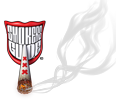One of our team members were filming Amsterdam on a sunny September day, while walking to the Greenhouse Coffeeshop, and came across a large crowd of people and loud cheering. After squeezing through, they discovered this performance by a group of b-boys from various countries.
Though technically not free, because the gang work for tips, as any other street performers, it is one of the low cost perks of visiting Amsterdam! Make sure to tip street performers - they put a lot of love into their profession!




